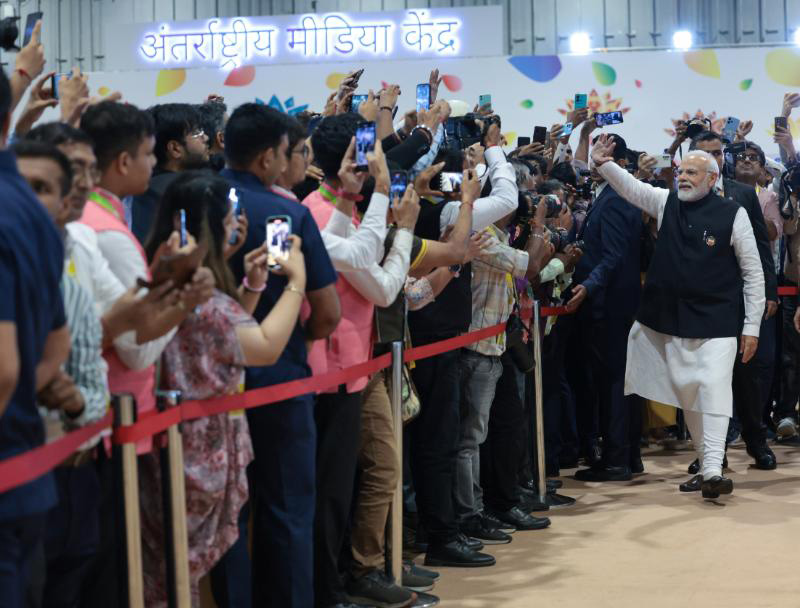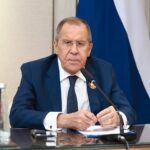
Prime Minister Narendra Modi at the International Media Centre at G-20 Summit, at Bharat Mandapam, in Pragati Maidan, New Delhi on September 10, 2023.
 By Sergey Lavrov*
By Sergey Lavrov*
The G20 Summit was an unqualified success. First and foremost, it was a success of the Indian Chairmanship, but also of all of us. The G20 is undergoing an internal reform. One aspect of this reform is that the member countries representing the Global South have become more proactive, with India leading the way. They have been clear and persistent in ensuring that their interests are included in the agreements negotiated by the G20. As a result, they were included in the Declaration.
They are eager to change the way the G20 is conducted so that the role of the Global South in global governance mechanisms is strengthened to adequately reflect its real weight in world affairs, including in the economic sphere, where BRICS has already surpassed the G7 countries in terms of gross national product.
The Declaration formulates the tasks of reforming the IMF, where, if quotas and votes are divided fairly, the Americans will not have an artificially preserved entitlement to block all others. The summit will give a serious and positive impetus to the efforts to reform the IMF and the WTO (it is also explicitly stated), which are artificially restrained by the Americans and their allies.
In the same vein, there is an emphasis on the need for the West to fulfil its commitments and long-standing promises, which are not being kept, including the transfer of technology. It is firmly stated that developing countries will no longer put up with being presented with a false choice: either to fight poverty or to invest in fighting climate change. This is a false dichotomy.
The challenges of economic and social development take centre stage. In that regard, the Declaration also records the need to fulfil long-standing promises to transfer technology to the Global South, not just take their raw materials and then add value and make a profit. It is also stated that the West has long signed up to allocate $100 billion annually to prepare economies to deal with the adverse effects of climate change. None of this has been done.
The Declaration reminds us of everything that needs to be done, in line with long-standing pledges, to ensure a balance of interests in the global economy. The road is not a short one. Nevertheless, this summit was in some ways a watershed in terms of a clear focus on these challenges.
I would also like to note the important role played by the Indian presidency, which, for the first time in the history of the G20, has consolidated its participants that represent the Global South. Our BRICS partners, particularly India, Brazil, and South Africa, were highly active in this regard. This consolidated position adopted by the Global South in defence of its legitimate interests helped thwart the West’s attempt to Ukrainianise the agenda at the expense of discussing pressing issues facing developing countries.
Notably, the Ukraine paragraph is part of the agenda and is a subject of consensus, but it is not about Ukraine. Indeed, it mentions the Ukraine crisis, but only in the context of the importance of resolving all existing global conflicts in accordance with UN Charter goals and principles in their entirety and interrelation. This is important because as soon as Ukraine is mentioned, the West tends to avoid intellectual discussions and demands the cessation of Russian aggression and the restoration of Ukraine’s territorial integrity.
Territorial integrity is enshrined in the UN Charter alongside the principles of equality and self-determination of peoples, but it was, in fact, included in the charter at a later date. We explained to our colleagues (we had many discussions about that behind closed doors) that when a state coup took place in Kiev [Kyiv] in February 2014, and the coup leaders immediately declared their objective of abolishing the status of the Russian language in Ukraine, it served as a trigger. The residents of Crimea and Donbass [Donbas] were outraged and stated that they did not want to live in such a country. By treating its own citizens in this way, the Kiev regime undermined its own territorial integrity. The UN General Assembly’s declaration on Principles of International Law states that the territorial integrity of states must be respected if their governments adhere to the principle of self-determination of peoples and represent the entire population residing within the borders of the territories in question. I believe that it is self-evident that the masterminds and perpetrators of the February 2014 coup in Kiev cannot claim to represent the interests of the residents of Crimea and eastern Ukraine. So, the Kiev regime destroyed its own territorial integrity and, in full compliance with the UN Charter and international law, the principle of self-determination of peoples came into force. We made this point clear one more time. Clearly, the G20 members have a correct understanding of what is happening. I’m confident that some of our Western colleagues are perfectly clear about this as well, but they are banking on the strategic defeat of the Russian Federation.
Overall, the paragraph deals with geopolitical realities. In addition to the importance of resolving all conflicts around the world based on the UN Charter principles in their entirety and interrelation, it contains important agreements on how to proceed in the sphere of food security. Our position has been made known in full. President [Vladimir} Putin has repeatedly conveyed it. It is important (if everyone is interested) to reinstate the Black Sea initiative in full, including both components of the package proposed by UN Secretary-General Antonio Guterres, namely, Russian fertiliser and grain, and Ukrainian grain.
In this regard, I would also like to highlight another paragraph in the geopolitical section where the West had to agree to a significant shift in its position, calling for an end to attacks and the destruction of critical energy infrastructure related to agriculture. It does not explicitly mention it, but everyone understands that this covers the terrorist attacks on the Nord Stream pipelines, the Togliatti-Odessa ammonia pipeline, the strikes on the Kakhovka HPP, and the ongoing launches of drones against the Zaporozhye NPP. I believe this is a balanced and, most importantly, realistic paragraph that we supported.
Russian Foreign Minister Sergey Lavrov’s statement and answers to media questions following the G20 Summit, New Delhi, September 10, 2023




